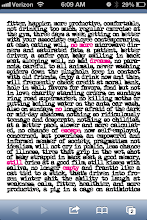Honestly I do not have much to say about Evelina thus far (which is not good since I have to do a presentation on Tuesday....). In the first volume we are introduced to a number of characters and are left at a point where Madame Duvel wants to appeal to Sir Belmont about acknowledging his daughter so that she becomes the rightful heir to his fortune and name.
So a few things I've noticed:
1. Evelina is much better model of virtue and innocence than Pamela was. Evelina acts proper but does not boast about her innocence and beauty. Her beauty is mentioned a few times, sometimes by herself in the letters to Rev. Villars and sometimes by others in other letters. Evelina definately has one virtuous quality that Pamela did not have: HUMBLENESS.
2. As of right now, there seem to be too many people meddling in Evlina's affairs. Madame Duvel showed up out of nowhere, Rev. Villars is her "keeper," and Lady Howard also has her best interests invested into Evelina. Each person has a different idea of what is the best for her. Madame Duvel wants to sue her dad, Sir Belmont, to get him to take responsibility for his daughter, Rev. Villars wants to keep her in the country, and Lady Howard is playing both sides. Something tells me that this is not going to work out well for Evelina. Rev. Villars is more interested in her virtue and public reception based on her virtue (106-107) while Madame Duvel is more worried about her status and public reception based on wealth (102).
3. And what do we do with yet another girl without a father, nontheless a father that abandoned her mother after marrying her, tainting her birth. Right now her reputation is at stake becuase if this is revealed and Sir Belmont continues to deny her as his legitamit child, this can pose problems for her as well. No one wants a woman that is from an unworthy birth.
4. As far as writing goes, Evelina is much more developed and has a more complex story line than the other stories we have read. In Pamela after 111 pages, we were already almost to the climax of the story without much more development left to go, even though Richardson drones on for another 400 pages or so after that. In Evelina, Burney has developed a plot line that has a lot of room for development and some suspense. At the end of volume 1, the reader is not quite sure what is going to happen. Even though it is written in the epistolary style like the others, Burney shows her skills in writing and the development of the novel as a form. Her characters are more complex, her plot is more complex, and the reading is easier to take in and follow. This is much more like the novels we are used to and has broken away from the older prose forms that, for me anyways, were not always as fun or easy to read.
Sunday, March 29, 2009
Subscribe to:
Post Comments (Atom)




I have to agree that the story does start a little slow but one other issue I had was the abrupt introduction of too many characters too fast, I couldn't keep up with who's who, and I kept getting confused of which character did what. All the "Sir" this and "Madame" that was a bit much to jump straight into the novel, I understand the usage of the "media res" technique but it was difficult to distinguish what person did what.
ReplyDeleteYeah that was confusing. Part of the reason Burney does this is because she wants the reader right from the start to begin analyzing and thinking about the characters in relation to their conduct. In order to do so, she has to give us all these names and their relations quickly so we know who goes to who and then the reader can begin to critique them and kind of compile a list of who Evelina should be with and who she shouldn't and how Evelina works within all of this. Burney wants the reader to see that Evelina only wants to be in the company of the virtuous characters, regardless of their relation to her. Even starting in the middle of the action does not necessarily mean that almost all the character be introduced at once, but because all of the other characters serve as a measure of Evelina's virtue and the reader's interpretation of the novel, it is crucial they are all there, confusing as it may be, from the start.
ReplyDeleteAh yes! We are back to the importance of a name with social worth to a woman. In comparison to Pamela...Evelina does have Villars to fall back on, she is of no burden to him. Madame Duval is annoying to the characters as well as the readers...or maybe just me. But you are right she is the only character who says "fortune".
ReplyDeleteFirst sentence- love it. I remember you not being a huge Pamela fan, as I was not myself. I think she was so asking for trouble by feigning innocence. Evelina is funny though because of the predicaments she gets herself into, which really proves her innocence and virtue, if not, her unfamiliarity to societal "etiquette." But I do agree that Burney does a good job of making Evelina introspecitive so that we think about and analyze her thoughts as well as those of other characters. See, Carissa? Brit Lit isn't so bad.. ;)
ReplyDelete